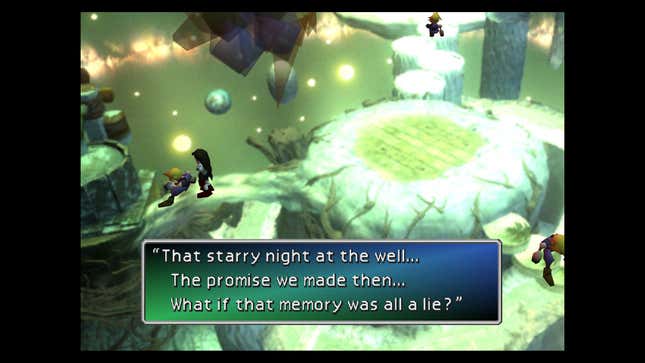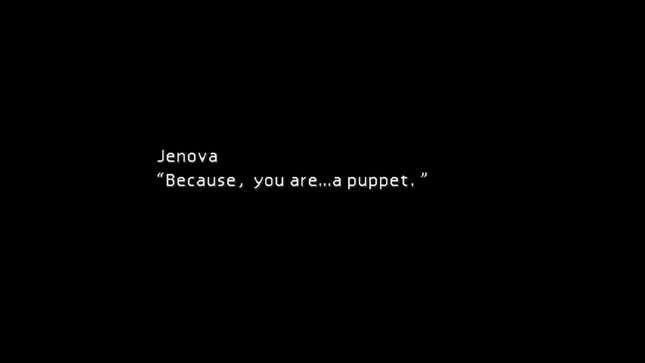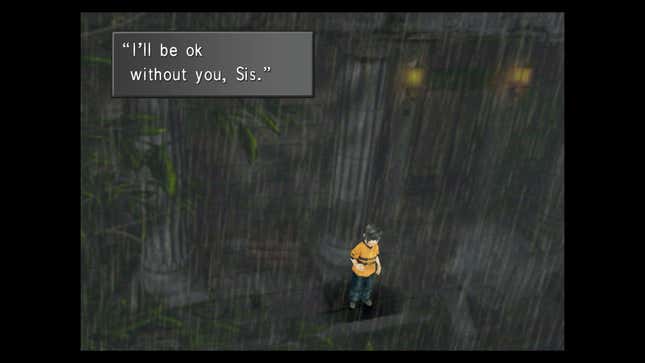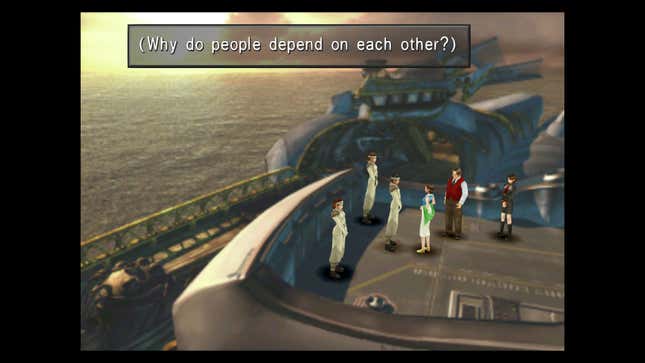After replaying the unique, 1997, Last Fantasy VII not too long ago, I knew the subsequent step for me was to instantly leap into Last Fantasy VIII. As my favourite recreation within the franchise, I can hardly resist any alternative to play FF8, however this time I felt extra inspired to attract factors of comparability and variations between it and FF7. Although they function completely completely different worlds, characters, and tales, they work collectively as virtually narrative cousins in an inspiring and interesting method.
Learn Extra: Last Fantasy VII: The Kotaku Retro Assessment
Although they’ve their clear variations, I used to be at all times struck by howFF7 and FF8 function on comparable wavelengths. They inform comparable tales—albeit with very completely different tones, and are each a fusion of science fiction and fantasy, using the tech of the ‘90s with 3D fashions superimposed over pre-rendered backgrounds with fastened digital camera angles. Taking part in them typically looks like a really comparable expertise. And, notably, each video games function characters who wrestle with reminiscence loss.

However whereas FF7 places its protagonist, Cloud, via crippling episodes of ache on the reemergence of his reminiscences, FF8 is way extra light with its solid of orphans, virtually as if it needs to think about a greater future and current for them than FF7 affords its solid.
Learn Extra: Taking part in Last Fantasy VIII In 2024: Every part You Want To Know
FF7’s narrative typically feels sinister at instances, with bursts of static punctuating the frail thoughts of the aptly named Cloud Strife, with the menacing threats of the sport’s antagonists Jenova and Sephiroth lurking behind each nook. Cloud isn’t afforded a second to be a traditional particular person, to have regular ideas. As an alternative, he spends a lot of the sport posing as somebody he’s not.

Whereas FF8’s characters have additionally misplaced their reminiscences, they’re allowed more room to be themselves. Protagonist Squall’s realizations and inside monologues are allowed to breathe and mentally wander. FF8 options much more inside monologues, lots of which doc the characters working via tough and complicated conditions. It’s one thing that Cloud isn’t afforded the chance to do. Squall’s ideas are befitting of an ungainly 17-year-old child whose childhood reminiscences have light, as he’s pressured to take care of a set of cosmic expectations which are onerous to totally comprehend. Whereas Cloud emerges from a much more traumatic previous, with sharp inside ideas that fairly actually wound him. Unpacking his reminiscences is a violent ordeal, one which forces him, and his childhood buddy Tifa, to undergo a surreal and painful journey of recollection.
Learn Extra: Is This Aerith’s Ghost In The Unique Last Fantasy VII?
In FF8, the pressures of the geo-political state of affairs round Squall and the opposite characters are intimidating, little doubt, however the tone is wildly completely different. That is very true of the second the characters regain their reminiscences of themselves and one another.
FF7’s greatest tragedy is impactful, sharp, and harrowing, that includes the irreversible loss of life of a personality. FF8 feels prefer it needs to be kinder to its solid. Moments that could possibly be a matter of life and loss of life, similar to deciding easy methods to break up the social gathering when Galbadia launches missiles at Balamb Backyard, don’t finish in irreversible tragedy. FF8’s characters reside to see one another once more, and reside to recollect one another in a extra light method.

The variations in how each video games depict their worlds, and the areas give to the participant are additionally of word. FF8’s Balamb Backyard, for instance, is a form of house that FF7’s characters, maybe except Purple XIII and possibly Yuffie, are afforded. Most locations in FF7 are in some state of oppression and tragedy. FF8, although, portrays extra regular, different home settings that aren’t as downtrodden and reliant on a dangerous power supply owned and distributed by a vicious, militant company. I typically discover the world of FF8 extra alluring to day dream about due to this. Or, on the very least, it’s a setting that evokes extra optimism.
Learn Extra: So You Need To Play The Unique Last Fantasy VII?
That distinction is what makes enjoying these two back-to-back at all times a nice expertise. It’s simple to stroll away from FF7, I feel, with a way of despair and uncertainty. True, FF8’s conclusion can also be fairly mysterious, but it surely spends much less time underneath fast narrative strain like FF7 does. In consequence, enjoying FF8 instantly after FF7 gives alternate views and evokes completely different emotional contours. The expertise of enjoying each affords a form of trans-narrative decision that’s refreshing in a world dominated by a gentle development of direct sequels, prequels, and remakes in video games.

FF8 will at all times be my favourite Last Fantasy, however I do love considering of FF7 and FF8 as associated to at least one one other, dealing with comparable settings and themes with completely different approaches. And shifting from one universe to a very completely different one, as Last Fantasy used to, is the form of factor I hope the collection regains. A lot as I’ve loved some sequels like X-2, XIII-2, and each FF7 remake installments, shifting throughout separate worlds whereas nonetheless vibing on suitable themes is one thing Last Fantasy used to do nicely, and is for my part much more fascinating than sequels that supply little greater than further lore dumps.
.






